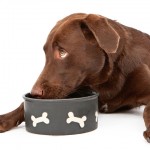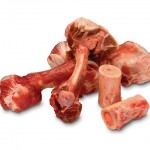Is Your Dog Merely Surviving Or Is He Thriving?
Some dog owners believe their dog is completely healthy on a kibble diet, but there are some important nutrients that are not yet deemed essential under the official nutritional guidelines for pet foods. Young animals can appear to be full of life and the picture of health but what is going on inside their bodies as they grow, mature and reach their senior years? As dogs age, their owners may find they just don’t have the same vitality they once did. It’s often attributed to getting older but it could be a sign of nutritional deficiencies in the diet that are not yet fully understood. Below are some nutrients that are found in a properly balanced raw diet but are often missing from commercially prepared pet foods. Don’t leave these important nutrients out!
Live Enzymes
Enzymes are biological molecules responsible for thousands of chemical processes in nature. They help sustain and support life. Most enzymes are proteins that act as catalysts for thousands of metabolic reactions in the canine body and help maintain homeostasis. If there’s a mutation, change or termination in production, disease can occur. When mammals are born, their cells are programmed to produce a certain amount of enzymes within their lifetime. The rest must be obtained from food. When the body is burdened by the job of producing every enzyme, it becomes deficient and vulnerable to disease and dysfunction. Glands and major organs suffer from enzyme deficiency. This often becomes more apparent as the dog ages and loses vitality.
Enzymes
Cooking food denatures live enzymes and can cause enzyme deficiency in your dog. Unfortunately, there’s no easy way to diagnose enzyme deficiency since it affects each animal differently and can show up as any number of metabolic diseases. There are tests for EPI (exocrine pancreatic insufficiency), which is usually genetically acquired. EPI is the pancreas’s inability to synthesize and distribute digestive enzymes properly. Vets can also test certain enzyme levels in the blood but this is usually only done in severe cases. A low-grade enzyme deficiency may go unnoticed for many years.
A raw diet naturally provides enzymes that dogs have obtained during millions of years of evolutionary growth. Access to live enzymes allows the DNA of the cells to maintain its integrity. If your pet can’t eat a raw diet, it’s a good idea to add a good quality digestive enzyme support supplement. Adding supplemental enzymes to the diet can improve digestion, metabolism, organ function, skin health, allergy symptoms and much more.
To learn more about digestive enzymes, click here!
Synthetic vs Naturally Occurring Vitamins
Synthetic vitamins and minerals are “isolated” in a laboratory. They lack the cofactors and transporters found in naturally occurring vitamins. The Organic Consumers Organization recognizes this and emphasizes that synthetic vitamins are not recognized and utilized by cells in the same manner as their naturally occurring counterparts. Each natural-source vitamin has its own unique profile within the food that’s eaten; the enzymes and minerals that accompany it help the body absorb it.
Vitamins and minerals are not used or recognized properly without enzymes. All the pieces of the diet must be present to maintain your dog’s health and vitality. Most dry dog foods rely on synthetic vitamins and minerals for nutrition, so if you’re feeding kibble, your dog may not be getting the sustenance he needs for health. Ideally, your dog’s nutrition should come from whole, fresh foods, but when supplementation is needed, always look for natural supplements derived from food, rather than synthetic products.
Unaltered High Quality Protein
Your dog’s health will be reflected in the quality of proteins he eats. Proteins found in meat by-products (not approved for human consumption) are not the same quality as fresh, unaltered, lean, human grade meats. If you wouldn’t eat it, why feed it to your pet? Also, cooked meats lack live enzymes that allow your dog to absorb the nutrients in his food. Dry dog food ingredients are usually processed at very high temperatures. If it’s cheaper in price, there’s a reason. Cutting corners on quality could cost your pet his health, which won’t be cheaper in the end. Providing fresh, high quality foods is the best pet insurance you can buy for your dog.
Water
Is your pet thirsty?
Do you believe it’s normal for your dog to drink several bowls of water a day?
It’s not! Thirst is the product of dehydration. Long term systemic dehydration can cause devastating health problems including metabolic kidney and liver diseases. Dry foods naturally contain higher protein levels than wet foods, as you’ll find if you compare nutritional analyses of dry, dehydrated, canned and raw diets. The kidneys have the task of breaking down most of the dietary protein, which creates urea and nitrogen that circulate in the blood. The kidneys also filter these waste products which are excreted in urine but when the kidneys are not functioning correctly, these levels can become elevated in the blood*.
After eating dry food, a dog becomes dehydrated and thirsty, and then needs to drink water to replenish fluid in and around the cells. It requires energy and time for the cells to rebalance. This puts unnecessary stress on the entire organism. Fresh foods have a moisture content of 70 to 80 percent, which protects homeostasis from the stress of dehydration. This allows the animal to keep water evenly distributed throughout the body at all times, not just sometimes. Don’t forget that water is actually the most important nutrient of all. If it occurs naturally in food, there’s a reason!
The Balance
Providing a balanced diet of raw, fresh foods is the easiest way to be sure your dog is getting the officially “essential” nutrients as well as those that may be missing. All nutrients found in food are essential to life or they wouldn’t be there. Nature is a highly organized and efficiently-run system that allows all creatures and plants to thrive in their environment. We can’t deny our dogs access to this system without disrupting the natural order in which they function. Consult with your holistic vet or a pet nutritionist to make sure you’re providing all the dietary components your dog needs to flourish
* Raw fed dogs have naturally elevated blood urea nitrogen (BUN) levels and this does not necessarily mean they are in renal failure.
Source
Sarah Griffiths, DCH, CPN is a classical homeopath and clinical pet nutritionist with an extensive background in the husbandry of wild canines and felines. She consults with local veterinarians and for 3P Naturals , a raw pet food company based in Vancouver, BC. Sarah runs free raw pet food education seminars in the Lower Mainland of British Columbia, Canada and helps pet owners with raw diet planning, troubleshooting and individual supplementation. She is the proud guardian of Rowan, a raw fed harlequin Beauceron.











